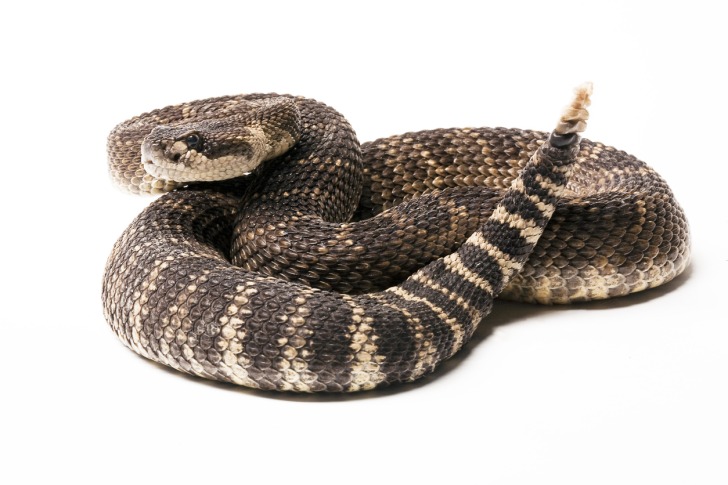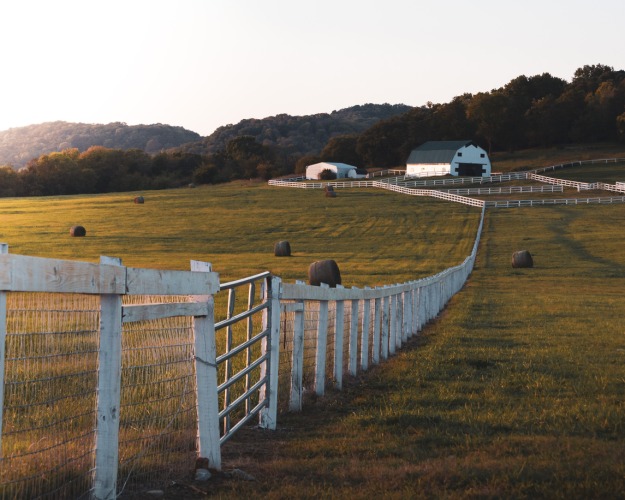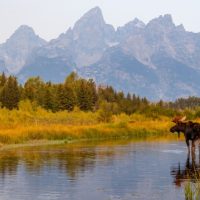Tennessee stretches from the Appalachian Mountains to the Mississippi River delta.
There is a lot of diversity in geography and wildlife.
There are 32 species of snakes and a lot of different kinds of habitat.
Only four of those are poisonous.
Snakes are not commonly seen, but there can be a danger if you are out in the woods or by waterways.

Contents
So… Are There Snakes in Tennessee?
There are 32 species of snakes in Tennessee.
While there are big cities like Nashville or Memphis, a lot of the state is rural and that is where snakes can be found.
Even though there are a lot of different kinds, snakes do not tend to go where people are.
There is a good possibility that you will not see a snake if you visit the state.
Snake Species in Tennessee
Poisonous snakes
Four of the 32 species of snakes in Tennessee are poisonous.
The Timber Rattlesnake lives in East and Middle Tennessee.
It is the largest and most dangerous snake in the state.
These are found in woodlands, and they will avoid people if at all possible.
Timber rattlesnakes can grow up to 60 inches long.
The Pygmy Rattlesnake is a smaller snake that can still be dangerous.
They are tan and very small, just two feet long, and that can make them more dangerous because you don’t see them.
Cottonmouth, also called water moccasins, are in rivers and ponds in West Tennessee.
They are dark green or black.
They are poisonous but not aggressive, and only bite if they feel threatened.
Copperheads live around trees or rocks and are sometimes found in brushy areas or edges of fields.
They are found throughout the state, but more are in the Smokey Mountains and other mountainous areas.
Non-poisonous snakes
Water snakes: There are five species of water snakes other than the poisonous cottonmouth.
They are Mississippi Green, Southern, Plain-bellied, Diamond Backed, and Northern.
The diamondback is not related to the diamond-back rattlesnake found in the western USA.
Water snakes like to live in or around water.
They can be found on dry land around water, but are most commonly in the water.
The Yellow-bellied Kingsnake has a black body with a light yellow belly.
They can get to four feet long, but are thick snakes and look larger.
There are two varieties and are found in the eastern and middle parts of the state.
The common kingsnake, and the eastern hog-nosed snake, are also varieties of kingsnake.
The Milk Snake is red, with white and black rings.
They are harmless but look like poisonous coral snakes.
The milk snakes have black rings while the coral snake does not.
Milk snakes are often found around barns, and legend has it that they suck milk from cows.
That is how they got their name.
Coachwhip snakes are rare and found only in the southwest corner.
They can be brown or black.
They are very long and very thin.
They are very fast and can travel several miles per hour.
They are not poisonous but can bite a person.
Garter snakes are found throughout the state.
They are usually two feet long and dark brown with yellow stripes.
They are harmless and not afraid of being around people.
They eat a lot of bugs that are pests and are good for the environment.
Rough Earth Snakes are olive or dark tan, and relatively docile.
They are found only in the southwest corner of the state.
There is also a rough green snake that is related.
Most snakes are shiny and smooth; rough snakes have a more rough appearance or are less shiny.
Some other species that are similar to garter snakes include Pine snakes, Queen snakes, Brown snakes, Ribbon snakes, and Green Snakes.

Is it Safe to Go on a Trek in Tennessee?
The Appalachian Trail goes through the eastern part of the state, and there are many more miles of popular trails.
It is safe, but there are snakes at times and one should use caution.
There are also dangers from other wild animals and even things like ticks that can cause illness.
Even so, simply paying attention to your surroundings and taking some basic precautions, should keep you safe on the trails in Tennessee.
Interesting Snake Facts in Tennessee
Rattlesnakes get all the attention, but there are more bites from copperheads than any other kind of snake in Tennessee.
Snakebites are rarely fatal, with only one in 600 bites killing the person.
Copperhead bites are rarely fatal, but they can be painful.
Rattlesnake poison is much stronger and can cause a lot more damage to your body.
Medical attention is recommended for both, but even more for a rattlesnake bite.
In some remote areas, there are religious groups that have “snake handling” services.
People believe they can pick up a snake, and if they have enough faith, it will not bite them.
It is a rare practice, but there have been a few people killed doing this.
Some non-poisonous snakes give off an odor, or even a smelly liquid when they feel stressed.
You could get some smelly goo on your hands if you handle one of those, but they are not poisonous.
3 Safety Tips for Exploring Nature in Tennessee
- If hiking in the eastern mountains, keep a lookout for copperheads. They give no warning, but won’t bite you unless you step on them. Staying on the trail will normally keep you safe. Watching out for rattlesnakes is also a good idea, but they give you some warning before they strike.
- Avoid picking up rocks or firewood, without checking for snakes first. They like to hide under rocks or pieces of wood. It’s also a good idea to not put your hands where you cannot see, so be careful climbing on rocks.
- Stay on the trial. Snakes won’t bother you if you don’t step on them or startle them. They are unlikely to be on the trail itself, and that is an area you can see. Keep an eye on the ground as you walk the trail will keep you safe.
Summary
There are a good number of snakes in Tennessee, but only four kinds are dangerous.
There are a lot of rural areas in the state, and a lot of places to go hiking.
If you pay attention to where you step, you should not have any problems with snakes.
Snakes are relatively common in Tennessee.
If you spend time in rural areas you are likely to see one, though most of them are harmless.
Tennessee Safety Overview
READ THE FULL REPORT: Tennessee Safety Review
Safety Index:
- OVERALL RISK: MEDIUM
- TRANSPORT & TAXIS RISK: LOW
- PICKPOCKETS RISK: MEDIUM
- NATURAL DISASTERS RISK: MEDIUM
- MUGGING RISK: MEDIUM
- TERRORISM RISK: LOW
- SCAMS RISK: LOW
- WOMEN TRAVELERS RISK: LOW
Frequently Asked Questions
How many people die from snakebites?
Nationally, about five people die each year from snakebites, even though there are a few thousand across the nation each year.
In Tennessee, there have been seven deaths related to snakes over the last 40 years.
How many snakebites are reported in Tennessee?
The state averages about 79 reported snakebites each year, which puts it in the middle of the pack.
Texas has the most with 1400.
What is the most dangerous snake in Tennessee?
The Timber Rattlesnake is the largest, at about 60 inches long, and has the most dangerous venom of the four species of poisonous snakes in the state.











